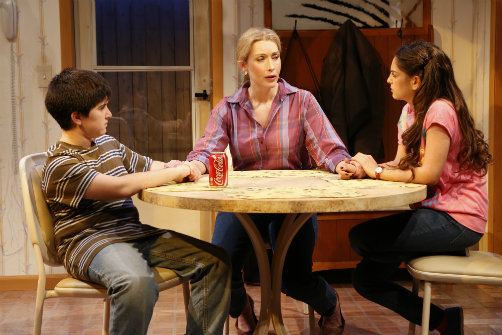117.
ON A STOOL AT THE END OF THE BAR
In brief, Tony DeMarco (Timothy John Smith), a macho lumberyard owner, is married to his second wife, Chris (Antoinette Thorne), with whom he enjoys a rich sex life. Chris is a caring stepmother to Tony’s three kids, and the kind of attractive woman who dresses in nicely tailored casual designer clothes, has her rich head of dyed strawberry blonde hair perfectly coiffed, and never goes around without her high-cheekboned face made up to the hilt.
 |
| From left: Zachary Brod, Antoinette Thorne, Sara Kapner. Photo: Carol Rosegg. |
One day, when Tony comes home earlier than expected
because of a work-related accident, he’s visited by Michael McCullough (John
Stanisci), who expected to be meeting with Chris. You see, Chris has been separated
for twenty years from her family because—here it comes!—she’s really a man who’s
had gender-changing surgery. Her conservative Catholic family rejected
her, but now her uptight dad has died, and Michael has come to give her a check
for the $97,000 she’s inherited. Michael hasn’t seen his “brother” in all these
years, and only his recent discovery that his own son is gay has
tempered his raging homophobic bigotry enough to make this visit possible.
 |
| Timothy John Smith, Sara Kapner. Photo: Carol Rosegg. |
It takes some time for Michael to realize that Tony
has absolutely no idea of what he’s talking about (Tony’s so ignorant he has no
idea that a.k.a. means “also known as” when he sees that the check is for “Christopher
Eugene McCullough a.k.a. Christine McCullough”). Tony also needs a lot of time to
digest the fact that his wife is a transsexual (the play’s word). Oil often
marries water, but, while one can understand Tony’s confusion and disgust, his
attitudes are so retro that it’s hard to see the more refined and well-spoken Chris—albeit with
a background as a hooker to pay for her operation—living with him in connubial bliss.
One might imagine that, had Michael and Tony not met
by accident, the latter would have remained in ignorance until his dying day,
but, whoops, the truth is out and Tony is so enraged that he’s been fooled into
marrying a “faggot” that he even gives the wife he loves the back of his
powerful hand. The rest of the play, which goes nowhere slowly, is concerned
with Tony’s struggle to come to terms with Chris’s egregious failure to divulge
her past (the play’s true subject) The only person from whom he seeks counsel is a clueless old priest (Robert
Hogan), who even wants to break the confidentiality of the confessional by
reporting the case to his bishop. During his confession, Tony divulges the fact
that, when he was young, he experienced fellatio (another word he doesn’t know when he hears it) on several occasions, and denies vehemently the priest’s suggestion that he himself might be gay, although the playwright clearly wants us to think there may be some truth in it. The
play wastes stage time with a scene between Chris and her female shrink (Liza
Vann), but provides no one who can offer Tony (and the audience) any sort of
reasonable explanation or counseling for his problem.
Anyway, the two-act, two-hour play stumbles along
without any important developments, only its several scenes that try to explain
the problem of transsexuality having any intrinsic interest. Tony’s younger
kids, 16-year-old Angie (Sara Kapner) and 13-year-old Mario (Zachary Brod), seem able to deal with
Chris’s revelations, but high school senior Joey (Luke Slattery) is as narrow-minded
and conflicted as his dad, and runs away. The play ends by hinting, inconclusively, that things may be stabilizing.
So the lesson is, if you’ve undergone sex change surgery,
make sure you tell your new spouse about it. Of course, this lesson can be
extrapolated to refer to any important information you withhold inappropriately
from someone who should have it, like the story my friend told me before the
show began about his failure to let the people for whom he was acting in a
commercial know he was a vegan, even though the job meant he’d have to eat ice
cream. If you don’t want unnecessary tsuris in your life, tell the truth!
ON A STOOL AT THE END OF THE BAR deals with a
situation ripe for dramatic treatment, but it fails to develop its situations
effectively and lacks credible or sympathetic characters. Mr. Callely has placed the story in the late 80s, but the behavior of these pre-Internet people seems to belong in a time capsule of the 60s. The play might have gained
more traction in a better production, but this one, with a paint-by-numbers set
by Jessica Parks and lackluster direction by Michael Parva, with its deadly
pacing and uninspired staging (including little things like having a kid take a
can of soda from the fridge three times and never open it), doesn’t do the play or the actors
much justice.
Most of the performers are solid professionals, but the soft-voiced, eye-rolling Ms. Thorne, despite being an actual transgender (the term an usher I spoke to used) performer who fronts a rock band (the Thornes), is not much of an actor, a major drawback that may make you wish you were on that titular barstool instead of at this play.
ON A STOOL AT THE END OF THE BARMost of the performers are solid professionals, but the soft-voiced, eye-rolling Ms. Thorne, despite being an actual transgender (the term an usher I spoke to used) performer who fronts a rock band (the Thornes), is not much of an actor, a major drawback that may make you wish you were on that titular barstool instead of at this play.
59E59 Theaters
59 E. 59 Street
Through December 14
.jpg)
.jpg)